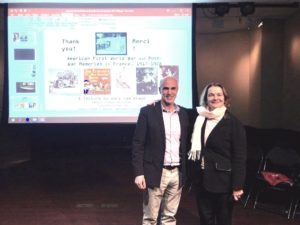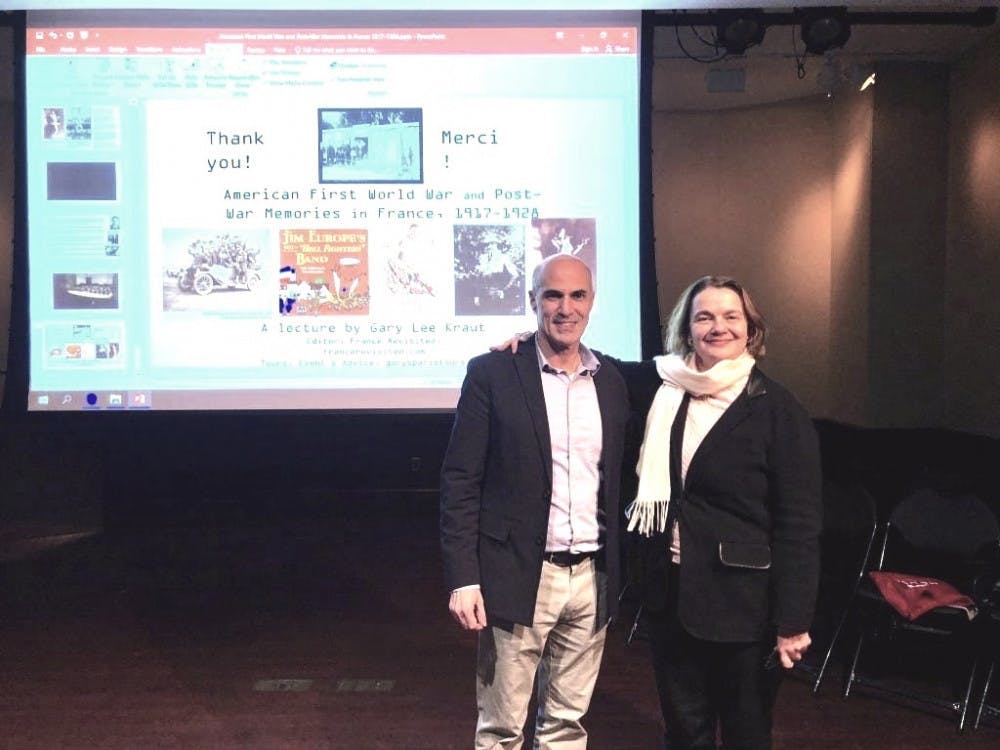By Jolie Shave
Staff Writer
Exploding bombs shook the soldiers’ underground haven as mustard gas seeped through small openings. Breathing through gas masks, they covered their skin as much as possible in order to prevent deadly reactions to the chemicals. Unsure when the war would end, knowing they could die at any moment, many carved their names into the soft limestone walls of the cave they hid inside. They engraved their own memorial.

Gary Lee Kraut, a travel writer and journalist, came to the College’s Library Auditorium on Feb. 19 at 7 p.m. to educate students about World War I and its effect on France. Kraut, who is an American and French dual citizen, is now the editor of “France Revisited,” an online publication that provides insight on the history, culture and touring in France. He has won awards for his guidebooks and articles and has made appearances on news outlets such as NBC and MSNBC.
French professor Ariane Pfenninger, who is also the French Club adviser at the College, helped organize the event. She explained that they chose to have Kraut speak at the College to commemorate World War I and the sacrifices of the parties involved.
“There is so much (history) that we don’t know,” Pfenninger said.
During his lecture, Kraut described people and events of the war. He made special note of the many battlegrounds and memorials he has visited, the “Carrière de Froidmont” quarry in France being one of them.
Most World War I memorials throughout France are uniformly lined with white crosses. The limestone quarry walls hold names of American, French and German soldiers.
The “Carrière de Froidmont” served as a shelter for each army at different points during the war as the front was pushed back and forth. French crosses, German crosses and American flags were drawn alongside bible verses in all three languages.
Kraut said he needed special permission to visit the site, which is located on private property and is inaccessible to the public. He climbed down the ladder and into the caves with five other men and one lantern. Standing only 200 yards away from where the narrow cave would open up, Kraut gained a new appreciation for the soldiers’ endurance.
“There was no mustard gas, there were no bombs and I had to get out of there,” Kraut said, acknowledging the feeling of claustrophobia that the cave brought.
Immersive moments like these helped Kraut build a connection between the history to which he was so deeply devoted. For Kraut, this moment was more than just realizing he did not like being in cramped spaces –– he had made a connection with the past.
Throughout his presentation, Kraut said that people should keep in mind to connect with history.
“I want you to be aware that this is your connection,” Kraut said in reference to America’s relationship with France and involvement in the war.
For Kraut, finding this connection is a matter of looking beyond typical tourist attractions. People should be curious and go off on a journey to find something that resonates with them. The key, Kraut said, is being open minded.
“When you’re open to it, then you feel connected,” Kraut said. “A lot of people, when they travel, immediately see the differences between ‘us’ and ‘them.’”
This is something that Kraut, who also works as a tour guide in France, helps prevent. He personalizes tours for his clients, taking them to places that interest them in hopes of helping them see beyond what is just in front of them.
To Kraut, the reality is that connections are everywhere because each place has its own history.
Despite the fact that they occupied the cave at different times, the limestone caves connected the American, French and German armies during the war. The memorialization of their names on the walls and shared prayers were their common threads.
Kraut encouraged students to dig deeper, understand history further and realize its importance.
“You can always reject your connection, and you can always say ‘this is a different period, it has nothing to do with me,’ but you’d be wrong,” Kraut said. “To say ‘I’m not interested in history’ is a bit like saying ‘I’m not interested in myself.’”







